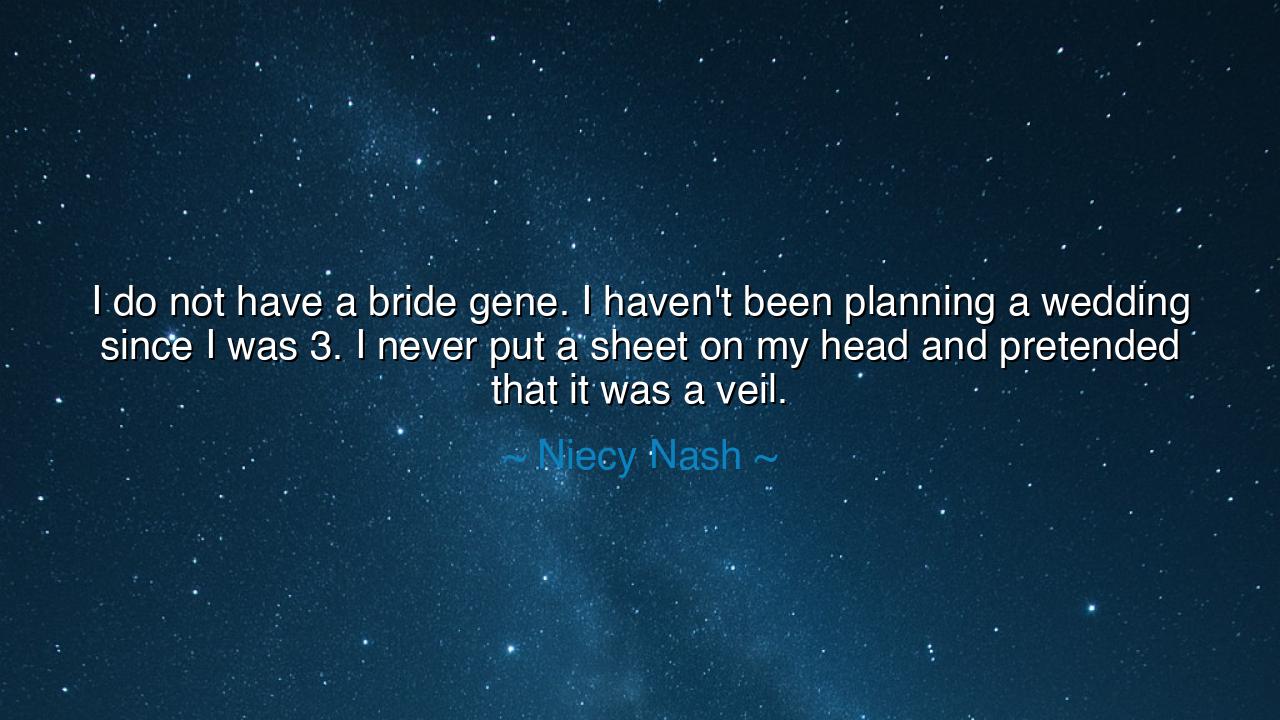
I do not have a bride gene. I haven't been planning a wedding
I do not have a bride gene. I haven't been planning a wedding since I was 3. I never put a sheet on my head and pretended that it was a veil.






In this bold declaration, Niecy Nash speaks to the expectations society places upon women from a young age. She proclaims, “I do not have a bride gene,” rejecting the notion that every girl is born with an innate desire to dream of her wedding day. From childhood, many are taught to play-act their future roles, draping sheets over their heads as veils, rehearsing a fantasy of romance and perfection. Niecy’s words challenge this narrative, declaring that her identity and dreams were never bound by this cultural script.
The image of a child pretending to be a bride is deeply symbolic. It represents the way society subtly shapes girls to believe that their ultimate purpose is to be chosen, adorned, and celebrated for one singular day. Niecy, by never partaking in this ritual of play, asserts her freedom of imagination, showing that her aspirations lay beyond the confines of lace and ceremony. Her refusal is not a rejection of love, but a declaration of independence — that she is more than the roles imposed upon her.
Historically, weddings have been laden with meaning far beyond personal joy. In many ancient cultures, marriage was less about love and more about alliances, property, and duty. Young girls were raised to see themselves as future wives and mothers, their value tied to the unions they would one day form. In royal courts, this was especially stark: queens were often betrothed as children, their entire lives shaped by political necessity. Niecy’s words echo as a defiance of this ancient lineage, a cry for a new era where a woman’s worth is not determined by her marital status.
Her perspective also highlights the diversity of womanhood. Some may dream of their wedding day from childhood, finding joy in tradition and fantasy — and there is beauty in that. But Niecy’s voice reminds us that there are many paths to fulfillment. Just as warriors, artists, and leaders have forged their destinies outside the boundaries of expectation, so too can women create lives rich with purpose without ever donning the symbolic veil. This balance of choices is what gives true meaning to freedom.
Thus, Niecy’s reflection becomes a lesson for future generations: do not let the world tell you what to dream. Whether your path includes a wedding or not, what matters most is authenticity — living a life guided by your own vision rather than inherited scripts. The veil, in this sense, is more than fabric; it is the weight of tradition. To remove it, or never wear it at all, is to stand boldly in the light of your own truth, unshaken and unbound.






P-22. Anh Phap -11.9
Niecy Nash’s comment is so relatable, especially for people who’ve never been caught up in the wedding hype. There’s no rule that says you have to dream of a wedding, and it’s great that she’s calling out this expectation. It reminds me of how much society places on women in terms of 'traditional' desires. Do you think there’s a shift happening where more people are questioning traditional wedding norms?
TPPhan The phong
I admire Niecy Nash for expressing something that many people might feel but not say out loud. Not every woman fantasizes about a wedding, and it’s refreshing to hear someone speak openly about it. It makes me wonder, do societal expectations about weddings make people feel pressured to care about them more than they naturally would? What’s your take on the pressure to conform to wedding traditions?
KANguyen Thi Kieu Anh
I find this quote really liberating. It challenges the notion that all women grow up fantasizing about their weddings. Niecy Nash is saying that she never had those childhood wedding dreams, and that’s perfectly okay. I think it’s important to question societal norms and expectations, especially around big life events like weddings. Do you think women are often made to feel less 'feminine' if they don’t dream about weddings?
PTTang Thi Phuong Thu
Niecy Nash’s perspective really speaks to those who don’t fit the stereotypical mold. The idea that not everyone has been planning their wedding since childhood is so real, and it’s a refreshing reminder that we all have different dreams and priorities. It’s interesting how society often pushes this wedding fantasy. Do you think it’s okay for women to not feel the same excitement about weddings as others?
HHoa
I love the honesty in this quote. Niecy Nash is expressing a feeling that many might not admit: not all women grow up dreaming about their wedding day. It’s refreshing to hear someone be so upfront about not having a 'bride gene.' I think it challenges the societal expectation that every girl should be obsessed with weddings. Do you think there's too much pressure on women to dream about weddings from an early age?